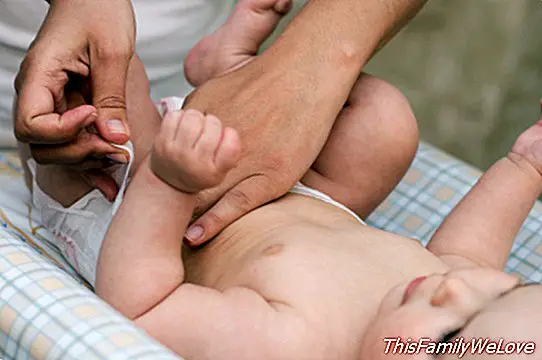Diarrhea in babies
Until your child reaches his first birthday and begins to babble his first words, parents should interpret if he is right or wrong. For this, it is important to know the symptoms that indicate when to go to the pediatrician. This is the case of diarrhea in babies, usually caused by a virus called Rotavirus.
Pediatricians talk about diarrhea in babies when there is a decrease in stool consistency or an increase in their frequency. They do not always suppose a medical emergency, unless the child presents symptoms of dehydration. They are usually caused by a virus known as rotavirus, they usually coexist with respiratory symptoms of the catarrhal type and can give tenths.
Attention to possible dehydration of the baby
The main complication of diarrhea is dehydration due to excessive fluid loss. The main symptoms of dehydration are the decay, the dryness in the mouth (that the tongue is not wet), the lack of tears, the shortage of urine (do not pee in 8 hours), a concentrated and dark colored urine, dry skin, sunken eyes and depressed anterior fontanelle (like an excavation). Therefore, the main objective of the treatment of diarrhea is to prevent dehydration.
Diarrhea: an easily contagious disease

Viral diarrhea is very contagious. Its transmission is known as "fecal-oral", that is, by changing the baby we can touch the stool, later take our hands to our mouths and infect ourselves. For this reason, specialists insist on the need to wash your hands very well after every diaper change, especially when there are more children in the house who can easily contract it.
The skin of your baby's bottom may be irritated due to diarrhea. Change your diapers frequently, wash it well and protect it with a thick layer of Vaseline or similar ointment. This protection is particularly necessary at night and when the baby naps.
Treatment of diarrhea in babies
Most pediatricians do not recommend treatment with antibiotics, except in cases of extreme severity. The important thing is that you constantly hydrate your child. Regarding diet, you should keep the same guidelines in children's meals; Whether you are breastfeeding your child or feeding him with bottles, you should not modify the guidelines in your diet, or in your child's. After four months, if you take solids, you can change your usual cereals for rice, as well as prepare fruit porridges based on astringents, such as banana and apple. It is good to know that your child will get the infection more than once in childhood, although the outbreaks of this disease will tend to be milder than the first.
The pediatrician can prescribe antidiarrheals, such as Tiorfan, based on racecadotril. Only in the most severe cases of dehydration will intravenous rehydration be necessary, that is, replenishing the fluids intravenously in the hospital.
When to go to the pediatrician because of the baby's diarrhea
Obviously, if something worries you and you do not know how to solve it, the specialist is the best person to solve it. In any case, you should go to the pediatrician whenever you detect signs of dehydration, blood in the stool, fever above 38.5 °, vomiting or a duration of more than two weeks.
What do I do if my baby has diarrhea?
- You do not have to worry if the evacuations of your baby are green or with a water ring, it is normal in babies who breastfeed.
- In the first 2 or 3 months of life, your kid can have a bowel movement every time he feeds. You only have to worry if they suddenly increase their frequency.
- A simple way to detect dehydration is pinching your son's tripita. A bad symptom will be when the skin stays white for one or two seconds, so you should act immediately and see a doctor.
- If you breastfeed, Maybe help your child feed him at more frequent intervals. If you already take solid foods, they will come in handy: rice porridge, applesauce, banana shavings, crushed carrots, mashed potatoes and other high-fiber foods.
Degrees of diarrhea
For its duration in time
- Sharp: if it lasts a week.
- Chronicle: more than two weeks. You have to look for other causes than rotavirus.
Because of its intensity
- Light: There is little evacuation, loose or soft.
- Moderate: there is an increase in frequency and it is becoming more liquid.
- Serious: There are many watery and abundant stools.
Causes of diarrhea
- For a viral infection of the wall of the intestines (rotavirus).
- By bacteria or by parasites. They usually have blood in the stool and fever.
- Due to an allergy or intolerance to the protein of cow's milk.
- Due to lactose intolerance.
Mayte Notary
Advice: Dr. Pedro de León Molinari. Pediatrician.




